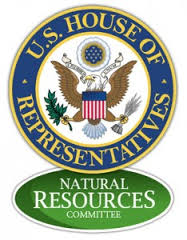 WASHINGTON, D.C. – House Natural Resources Committee majority staff released a report today that questions the independence and accountability of the peer review process in recent Endangered Species Act (ESA) listing decisions. The report entitled, “Under the Microscope: An examination of the questionable science and lack of independent peer review in Endangered Species Act listing decisions” studies the federal government’s peer review process for 13 different ESA listing decisions made by the U.S. Fish & Wildlife Service (FWS) since July 2013. The report found numerous examples of potential bias and conflicts of interests with the peer reviewers and a lack of transparency and consistency in the peer review process.
WASHINGTON, D.C. – House Natural Resources Committee majority staff released a report today that questions the independence and accountability of the peer review process in recent Endangered Species Act (ESA) listing decisions. The report entitled, “Under the Microscope: An examination of the questionable science and lack of independent peer review in Endangered Species Act listing decisions” studies the federal government’s peer review process for 13 different ESA listing decisions made by the U.S. Fish & Wildlife Service (FWS) since July 2013. The report found numerous examples of potential bias and conflicts of interests with the peer reviewers and a lack of transparency and consistency in the peer review process.
“The decision of whether or not to list a species under the Endangered Species Act has significant implications for the economy and livelihoods of impacted communities and private landowners. As such, these important decisions must be based on sound science that has undergone an independent peer review. This report raises troubling concerns about the lack of independence of the peer review process and whether many current, upcoming or recently finalized listing decisions, such as the White Bluffs Bladderpod in my Central Washington district, are scientifically sound,” said House Natural Resources Committee Chairman Doc Hastings (WA-04). “With hundreds of ESA listings driven by this Administration’s closed-door settlements with litigious groups, discovery of any potential bias about how ESA data and science are reviewed casts serious doubt on the credibility of these decisions, and provides more evidence that the ESA needs continued oversight and updating.”
Specific findings of the report include:
· The FWS does not have clear or consistent policies and procedures in place across all Regions to ensure that peer reviewers with potential conflicts of interest are identified and screened;
· The FWS generally seeks peer review of its proposed listing decisions at the same time they are made available for public comment, rather than earlier in the process when the peer reviewers may have more meaningful input;
· The FWS regularly recruits the same scientists on whose work a listing decision is based to serve as peer reviewers, including those who have known policy positions or affiliations with advocacy groups that support the listing decision, rather than truly independent scientists;
· The FWS uses scientists as peer reviewers who have received grants or other financial assistance from the Department of the Interior and its bureaus and other agencies; and
· The FWS routinely withholds from the public the identities of peer reviewers, qualifications of peer reviewers, and details about their comments.
###
NaturalResources.house.gov


